OUR LATEST NEWS
Find the latest news related to the activities led by the UNESCO Chair in Prevention of Violent Radicalization and Extremism and its network, including notable interventions of our experts in the media, in this section.
Publication in the Terrorism and Political Violence journal
- September 15, 2025
- Sylvana
- Literature Chair, News, Spotlight
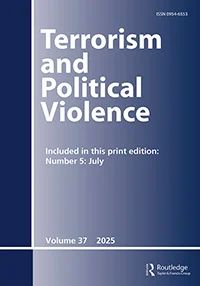
Pablo Madriaza, associate professor of the UNESCO-PREV Chair, along with David Morin and Ghayda Hassan, co-holders of the Chair, have published a new article entitled “How Rigorous are Evaluations of Violent Extremism Prevention Programs? Results from a Systematic Methodological Review” in the journal Terrorism and Political Violence. This study systematically reviews the quality of 267 evaluations published in English, French, and Spanish up to December 2022, addressing concerns over bias and limited empirical evidence. Using the Mixed Methods Appraisal Tool (MMAT), diverse study designs were examined —including qualitative, quantitative descriptive, nonrandomized, randomized controlled trials, and mixed methods—to assess rigor and
Summit on Climate Mis/Disinformation

Marie-Eve Carignan, co-holder of the UNESCO-PREV Chair, will participate in the Summit on Climate Mis/Disinformation, organized by the University of Ottawa’s Information Integrity Lab, on September 19 and 20. She will participate in a panel entitled “Fractured Narratives, Emerging Frontlines”, during which she will discuss the main factors and impacts of climate disinformation and misinformation. To register and for more information: click here.
Launch of the collective work “Polémiques publiques, médias et radicalités discursives”
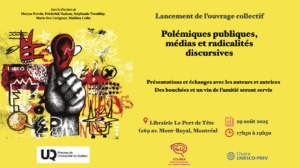
August 29 will see the launch of the collective work “Polémiques publiques, médias et radicalités discursives”, edited by our co-titular Marie-Eve Carignan, our researchers Mathieu Colin and Frederick Nadeau, as well as Maryse Potvin and Stéphanie Tremblay. The program includes: ✨ Presentations by authors 🗣️Discussions on media issues and contemporary radicalism 🍷Vin de l’amitié & bouchées 📍Librairie Le Port de Tête – 269 av. Mont-Royal Est, Montréal 🗓️Friday, August 29, 2025 ⏰5:30 pm to 7:30 pm Registration required: https://docs.google.com/forms/d/e/1FAIpQLSdf7oVYE8EQ9UcnJX8Y2PPOTXnbtX2lZP8mdPCrPd9VSEaUEQ/viewform?usp=send_form
Our researcher Mathieu Colin at the 45th anniversary of Info-Secte
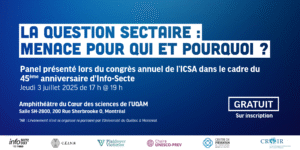
Mathieu Colin, researcher with the UNESCO-PREV Chair, will take part in the 45th anniversary of Info-Secte! A free event for the general public (registration required) will be held on Thursday, July 3, in a 5@7 format, during the annual conference of the ICSA (International Cultic Studies Association). For further information and to register : https://infosecte.org/events/panel-45e-anniversaire-dinfo-secte-la-question-sectaire-menace-pour-qui-et-pourquoi/
The Chair at the Centre d’études sur les médias’ colloquium in Toronto!
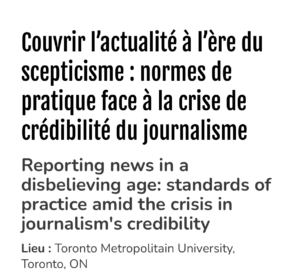
On June 5 and 6, Toronto Metropolitan University will be hosting a conference entitled “Couvrir l’actualité à l’ère du scepticisme : normes de pratique face à la crise de crédibilité du journalisme”. On June 6th, The scientific coordinator of the UNESCO-PREV Chair, Sylvain Bédard and Perrine Hely, research assistant, will take part in the event, giving a lecture entitled “Le scepticisme comme grief informationnel : Entre déviance politique et méfiance généralisée”. For further information: https://www.cem.ulaval.ca/evenements/couvrir-lactualite-a-lere-du-scepticisme/
Marie-Eve Carignan at the CÉRIUM’s summer school
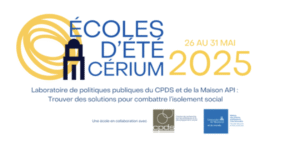
Marie-Eve Carignan, co-holder of the UNESCO-PREV Chair, will be taking part in the CÉRIUM – Laboratoire de politiques publiques du CPDS et de la Maison API : Trouver des solutions pour lutter contre l’isolement social! This Thursday, May 29, she will be taking part in this school, which aims to gain a better understanding of public policy development through a multidisciplinary and comparative perspective. Taking place from Monday May 26 to Saturday May 31, this event is organized in collaboration with the Centre de recherche sur les politiques et le développement social (CPDS) and UdeM’s Maison des affaires publiques et
